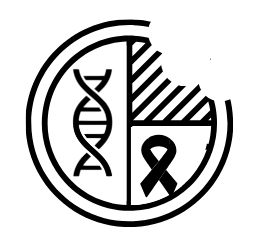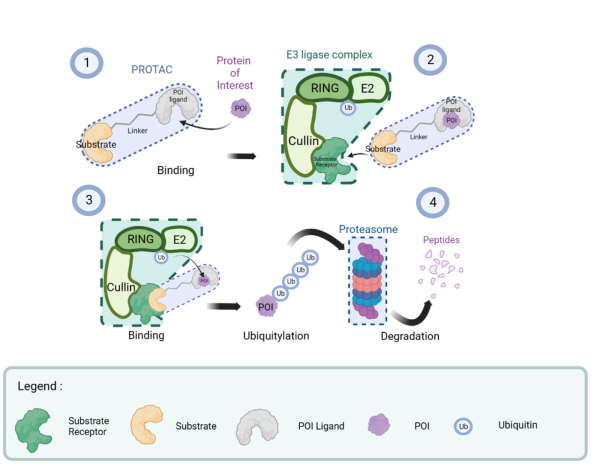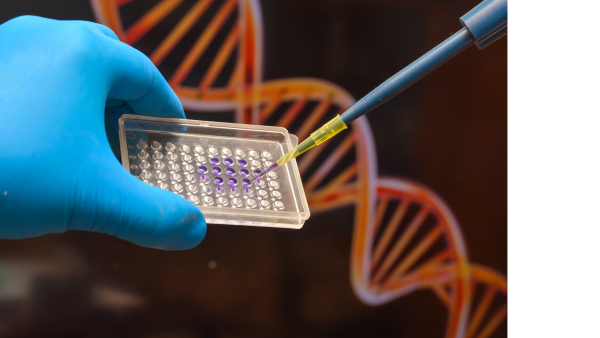Reading time: 12 minutes Felicites Rapon Recently, chemically engineered molecules have been produced to incite the degradation of a given protein. These molecules are called PROTACs [1], which stands for PROteolysis-TArgeting Chimeras. How does the degradation of a protein work? The degradation of a protein, also called proteolysis, is achieved by the mechanism of ubiquitination.... Continue Reading →
Is Genomics Helping us With Oncology Like we Thought it Would?
Reading time: 5 minutes Susan Egbert Genomics has significantly advanced the field of oncology by elucidating the genetic components of a range of cancer types. This progress has contributed to enhanced cancer diagnoses and more efficacious treatments.1-3 From targeted therapies to immunotherapy, genomics has revolutionized the landscape of cancer care. However, the current status and... Continue Reading →
Tracing the Footsteps of Lung Cancer
Reading time: 4 minutes Aya Elmeligy Tumor heterogeneity and lung cancer progression Intratumor heterogeneity is a key concept in the evolution and progression of many tumors, including lung cancers. As a tumor grows, its DNA continually develops mutations to overcome the effects of therapies. The cells that acquire these mutations are known as a subclone.... Continue Reading →
Can a Virus Treat Cancer? An Oncolytic Virus May Be the Answer!
Reading time: 5 minutes Hema Saranya Ilamathi Viruses have long been associated with illnesses in humans, like the flu and AIDS, but many people are unaware that some viruses can be used to treat cancer. Oncolytic viruses (OVs) are natural or genetically engineered viruses that selectively target and destroy cancer cells. Using viruses to treat... Continue Reading →
Extracellular Vesicles in Cancer
Reading time: 5 minutes Charlotte Boyd Extracellular vesicles (EVs) are small bubbles which are released from the cell. Cells produce multiple types of EVs which are different sizes ranging from approximately 30 nanometres to 10,000 nanometres. A nanometre is 10 million times smaller than a centimeter. This means that EVs are tiny and not visible... Continue Reading →
Take a Deep Breath… or Not: The Link Between Air Quality and Lung Cancer
Reading time: 3 minutes Melanie Padalino On February 3, 2023, a freight train carrying a large amount of vinyl chloride (a carcinogen) derailed in East Palestine, Ohio. The “clean-up” consisted of a controlled burn of the vinyl chloride, but this in turn generated a host of other hazardous chemicals including hydrogen chloride and phosgene which... Continue Reading →
Can Exercise Treat Cancer?
Reading time: 3 minutes Sydney Scatigno Why do people exercise? There are a number of reasons people choose to engage in physical activity like walking, running, lifting weights, or playing sports. The more obvious reasons can include losing weight, building muscle, or improving overall physical appearance, but can it help treat diseases like cancer? There... Continue Reading →
Collagen Can Fuel Cancer Growth
Reading time: 5 minutes Yonika Larasati Accumulating knowledge shows that cancer cells do not thrive in isolation. Just as seeds need suitable soil to flourish into plants, cancer cells might perish without an appropriate environment. This environment, known as the tumor microenvironment (TME), has become an emerging trait of cancer that can be a target... Continue Reading →
Patient-Derived Xenograft Models: Bridging the Gap Between Pre-clinical and Clinical Research
Reading time: 6 minutes Karli Norville It can take more than ten years to move a drug or therapeutic from discovery to FDA approval. Despite the years of research put in before a clinical trial begins, many therapeutics fail due to unforeseen safety complications or their lack of efficacy. Why do so many fail? Despite... Continue Reading →
Chromosomal Change: A Means for Cancer-Inducing Catastrophe
Reading time: 5 minutes Jessica Desamero Types of chromosomal abnormalities found in cancer Chromosomes are like books that store vast amounts of information, more precisely, DNA building blocks (genes) that compose all our genetic information. In this example, genes may seem as words spanning across the chromosomes that possess order and structure to give meaning... Continue Reading →
FLASHy Science: Looking at New Advances in Radiation Therapy
Reading time: 6 minutes Ryan Rispman Since its discovery, radiation has been a double-edged sword. On the one hand, radiation is a killer. It can break apart DNA, leading to mutations that can cause cancer and other diseases. Many of the early scientists who studied radioactive materials eventually ended up dying of radiation-induced illnesses1,... Continue Reading →
Recent Advances in mRNA-based Cancer Vaccines
Reading time: 4 minutes Indiwari Gopallawa After years of seminal research work, mRNA technology got its moment as a result of the Covid-19 pandemic. However, mRNA-based cancer vaccines remain a relatively new and untapped class of vaccines that show great potential. The enthusiasm for this novel technology has been increasing due to recently published experimental... Continue Reading →
Post-translational Modifications: The Balance of Intramolecular Toxicities
Reading time: 4 minutes Ian Lock By directing immune cells to attack tumor cells, immunotherapy uses the body’s own biological mechanisms to target and eliminate cancer. Recently this concept has been retooled for another class of therapeutics that capitalizes on a cell’s internal processes to target cancer cells. Adapted from Promega PROTACs or proteolysis-targeted chimeric... Continue Reading →
Systematic Racism in Cancer Care: From Henrietta Lacks to Modern Disparities
Reading time: 5 minutes Shan Grewal Henrietta Lacks was an African American woman born in 1920 in Virginia. In 1951, she experienced symptoms thousands of women experience today, a knot in her womb, abnormal uterine bleeding, and pelvic pain. She was sent to Johns Hopkins Hospital, where she was diagnosed with cervical cancer, now known... Continue Reading →
Phototherapy and its potential in cancer treatment
Reading time: 5 minutes Muhammad Ayhan Murtaza The word phototherapy comes from two words, “photo” and “therapy” which, evidently so, means “medical treatment using light”. The word has its roots in the older Greek language, but much like this old language, cancer is by no means a newer predicament. In fact, it actually predates human... Continue Reading →
Complexities in Metastasis Research
Reading time: 4 minutes Megan Majocha Can you imagine trying to put together clear, acrylic puzzle pieces? It is difficult to put together all the unknowns without a picture. Metastasis research is similar - trying to put the pieces together without knowing exactly how metastatic cells function in the human body. While cancer metastasis research... Continue Reading →
Cancer vs. Targeted Agents: A Molecular Arms Race
Reading time: 4 minutes Mia Hubert Chronic myelogenous leukemia (CML) is a slow-progressing disease resulting from an overproduction of blood cells originating from the bone marrow, known as myeloid cells. Before 2001, the standard of care included chemotherapy and bone marrow transplantation (BMT). Unfortunately, chemotherapeutic approaches were non-curative and BMT entailed a high-risk procedure with... Continue Reading →
AURORA US: Finding Solutions to Breast Cancer Metastasis
Reading time: 5 minutes Patty Spears Patients need more treatment options for metastatic breast cancer (MBC). MBC is when the cancer has spread from the breast to other parts of the body. Most patients with MBC stay on continuous treatment. This means that even those who live longer accumulate many toxicities (treatment costs and... Continue Reading →
Liquid Biopsy: The Clinical Utility of Circulating Tumor Cells
Reading time: 4 minutes Tala Tayoun A liquid biopsy test is a simple laboratory test done to sample and analyze non-solid patient biological tissue, i.e. blood. The era of liquid biopsy has revolutionized the field of cancer management. Over the last few years, we have witnessed significant technological advances in the detection and characterization of... Continue Reading →
How Does Inflammatory Bowel Disease Become Cancer?
Reading time: 5 minutes Colette Bilynsky The American Cancer Society has found colorectal cancer to be the 3rd highest cause of cancer deaths and 3rd highest estimated new cases in both men and women in 2022 [1]. The risk of colorectal cancer is significantly higher in people with inflammatory bowel disease (IBD): ulcerative colitis (UC),... Continue Reading →
Fatal Attraction: Luring Bacteria Into Tumors With Magnets
Reading time: 5 minutes Anthony Tao It goes without saying that magnets have uses beyond simply pinning wedding RSVPs to your refrigerator. In medicine, magnetism is a crucial component of magnetic resonance imaging (MRI), an invaluable diagnostic tool for clinicians. An MRI subjects the human body to an enormous magnetic field ‒ perhaps a thousand-fold... Continue Reading →
Updates in Pediatric Cancer: What’s New?
Reading time: 3 minutes Susan Egbert Pediatric cancer is a broad term that refers to cancers originating in children younger than 18. There are different types of pediatric cancer, but they all fall into one of two categories: solid tumors and leukemia. Solid tumors are cancers arising from cells in the body's tissues. These tumors... Continue Reading →
Anti-Angiogenic Cancer Treatments
Reading time: 5 minutes Aya Elmeligy Angiogenesis is the formation of blood vessels within the body to provide oxygen and nutrients to tissues. Tumors will hijack this process to allow for continued growth and metastasis by forming their own vascular system. Microvessel density within a tumor is often used as a prognosis tool, as the... Continue Reading →
Self-destructive Cancer: Tricking Tumors Into Targeting Themselves
Reading time: 3 minutes Aya Elmeligy When you think of cancer treatment you might think of aggressive chemotherapy, intense radiation, and endless drugs which all carry the risk of damaging healthy cells in addition to the cancerous ones. But ultimately, it is all worth it to hear the words “You are cancer free!”. But what... Continue Reading →
Tumor-on-a-chip: A Better Method for Drug Discovery?
Reading time: 7 minutes Nayela Chowdhury Conventional 2D and 3D models of cancer have widely been utilized in pre-clinical drug development; however, neither of the platforms mimics the dynamic interactions that occur in living tumors. In vivo studies (for example, in small animal models) have been central in translational cancer research and have contributed largely... Continue Reading →
‘Ubiquitous’ Ubiquitination Pathway and Cancer
Reading time: 4 minutes Deepika Jayaprakash What is common to eukaryotic organisms like animals, plants, fungi, and unicellular organisms? Ubiquitous Ubiquitin! Ubiquitin (ub) is a small protein found in all eukaryotes that when attached to its target protein can bring about a myriad of cellular processes. The first observed effect of ubiquitination was degradation of... Continue Reading →
Non-small cell lung cancer and immunotherapy
Reading time: 4 minutes Indiwari Gopallawa Cancer is the second leading cause of death after cardiovascular diseases in the United States and has a major impact on society. Lung cancer is the second most common cancer type and is associated with lower survival rates and higher cancer-related deaths, accounting for 25% of all cancer-related deaths... Continue Reading →
3D Screening of Compounds for Cancer Therapy
Reading time: 4 minutes Sydney Scatigno Over the last couple of decades, cancer research has made strides in improving the pre-clinical assessment of novel compounds. Compound screening, the process of assessing new compounds for efficacy, across various cell lines is an important step in finding the optimal drug candidate downstream in the drug development process.... Continue Reading →
CAR-Macrophages: A New Take on an Immunotherapy Classic
Colette Bilynsky CAR-T cell therapy is widely available in the United States, with 6 FDA-approved formulations, and has been previously discussed on Oncobites. However, a new clinical trial using the CAR (chimeric antigen receptor) technology is underway, but using macrophages instead of T-Cells in the hope of treating more types of cancer. But let’s take... Continue Reading →
Artificial Intelligence: A Threat to Us or to Cancer?
Reading time: 5 minutes Aya Elmeligy Introduction Cancer is a constantly evolving illness. This infamous disease crosses everyone’s mind, whether through fear of developing it or worry of never being rid of it. The key to overcoming this is early diagnosis and more effective treatments that are personalized to the patient. Literature regarding the average... Continue Reading →






























